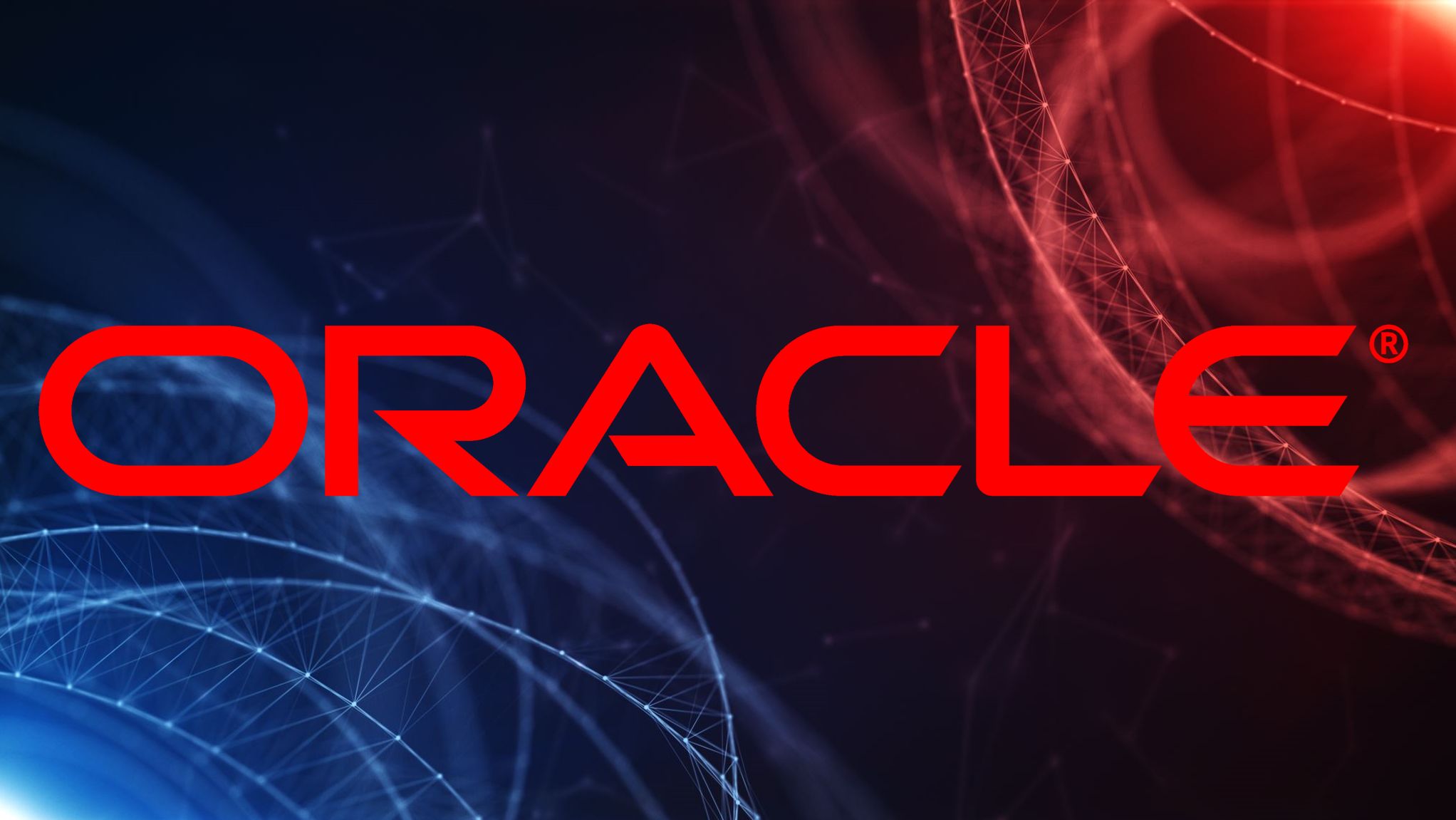Oracle software is often referred to as one of the world's leading database systems, but in fact Oracle is a global technology corporation (Oracle Corporation) that specializes in providing software, database, cloud computing, and hardware solutions for businesses.
This article by Bizzi will outline information related to Oracle so that businesses have a clearer view of the solutions that this technology company brings.
What is Oracle Software? Overview & History
Oracle Corporation is a multinational technology company headquartered in Austin, Texas (USA). Oracle is best known for Oracle Database - a relational database management system (RDBMS) that is considered a standard platform in many fields such as finance - banking, healthcare, manufacturing, government and telecommunications.
History of Oracle
Oracle started in 1977 as Software Development Laboratories (SDL), founded by three founders Larry Ellison, Bob Miner and Ed Oates in California, USA. Initially, SDL focused on developing a relational database management system (RDBMS), inspired by Edgar F. Codd's famous research paper at IBM.
Today, under the name Oracle Corporation, the company has become one of the world's leading technology corporations, providing comprehensive solutions from databases, ERP, business applications to cloud computing services.
Oracle currently has hundreds of thousands of customers in more than 175 countries and maintains a direct competitive position with giants such as Microsoft, SAP, Amazon and Google in the field of cloud & enterprise software.
Today, Oracle has expanded its product portfolio to become a comprehensive solution for businesses, including:
- Enterprise Applications
- ERP (Enterprise Resource Planning): Oracle E-Business Suite, Oracle Fusion Cloud ERP, NetSuite.
- CRM (Customer Relationship Management): Customer relationship management.
- HCM (Human Capital Management): Human resource and personnel management.
- Oracle Cloud Infrastructure (OCI):
Provides a powerful cloud platform for data storage, analytics, AI, and enterprise applications. - Middleware: For example Oracle WebLogic Server, Oracle SOA Suite, helps connect and integrate different applications.
- Optimized hardware:
Servers, storage devices, and hardware specifically designed to optimize database performance.
Oracle's main goal is to help businesses manage data, operate business processes, and optimize IT infrastructure.
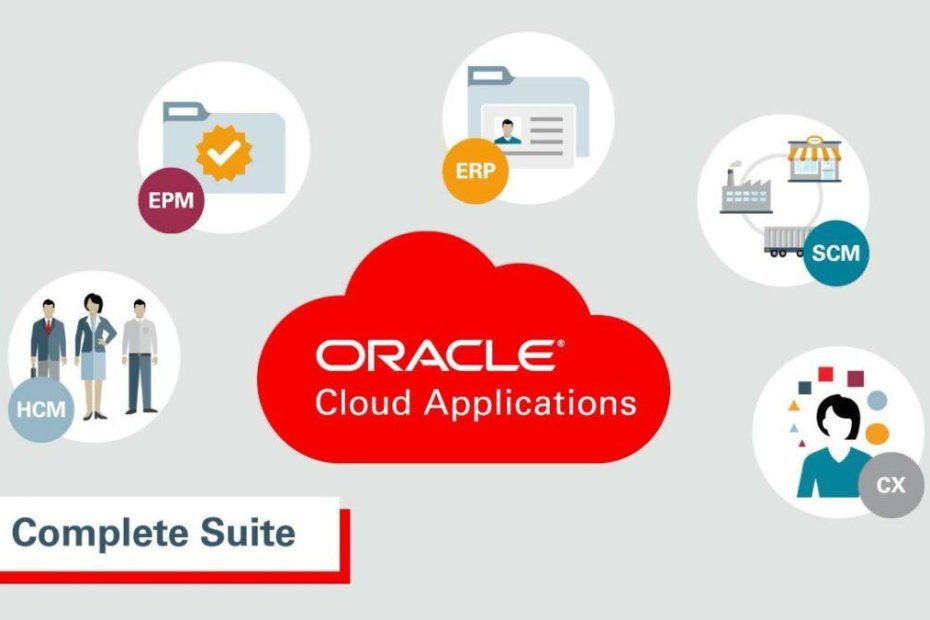
Oracle Highlights
Oracle is not just a software, but a comprehensive ecosystem that serves all the technology needs of businesses. Here are the factors that make Oracle the top choice:
- Top reliability and security
- Oracle Database is trusted by industries that require strict security such as finance, healthcare, and government.
-
- Integrates advanced security mechanisms such as Data Masking, Transparent Data Encryption (TDE), and Database Vault.
-
Flexible scalability
-
- From small and medium enterprises (SMEs) to multinational corporations, Oracle has the right solution.
-
- The system can be easily expanded as the business grows without having to change the entire infrastructure.
-
Diverse product ecosystem
-
- Not only providing software, Oracle also owns cloud infrastructure, middleware and hardware, helping customers build "end-to-end" solutions in a unified ecosystem.
-
Investing heavily in AI and Cloud
-
- Oracle is making a big shift to AI-driven Cloud ERP, integrating artificial intelligence to predict, analyze data and automate business processes.
-
- Oracle's cloud-native services help businesses reduce operating costs and accelerate digital transformation.
Oracle Software Core Solutions: From Database to Business Applications
Oracle is not only a leading database software provider, but also builds a comprehensive ecosystem that covers all enterprise technology needs – from data storage, process management, to cloud deployment and artificial intelligence (AI).
Understanding these solutions helps businesses plan smart digital transformation, optimize costs and improve competitiveness.
Oracle Database: The Heart of the Data System
Oracle Database architecture is built with three main components:
- Instance: a collection of memory and data management background processes, responsible for communicating with the operating system.
- SGA (System Global Area): a shared memory area that caches data, configuration information, and logs to speed up processing.
- Background Processes: background processes such as DBWR, LGWR, SMON, PMON help ensure stable operation, write data to disk and recover in case of failure.
Outstanding features of Oracle Database:
- Performance and scalability: handle huge volumes of data, serving millions of transactions per second.
- High reliability: powerful rollback and recovery mechanism, minimizing the risk of data loss.
- Data security: integrates Transparent Data Encryption (TDE) and Data Redaction to encrypt and hide sensitive data.
- High Availability: with Oracle Data Guard solution, data is backed up synchronously to the backup system, ensuring continuous operation even when the main server fails.
For example, a large bank using Oracle Database can maintain online transactions 24/7, while ensuring customer data safety with advanced security layers.
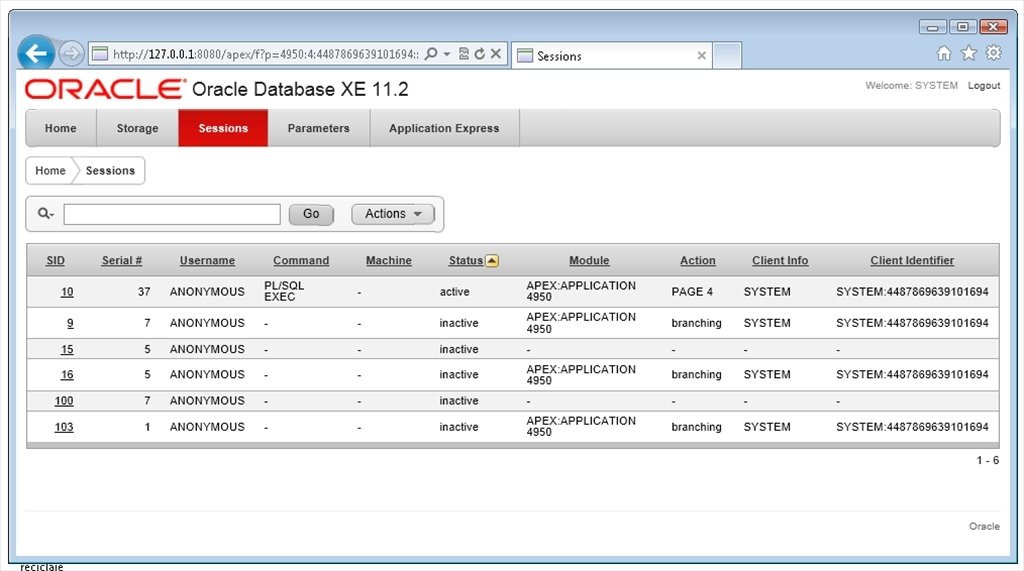
Broader software solutions (Oracle Fusion Cloud Applications)
In addition to the database, Oracle develops a comprehensive suite of business management applications, in the form of SaaS (Software-as-a-Service) on the cloud platform:
- ERP Cloud: financial management, accounting, procurement, project management.
- SCM Cloud (Supply Chain Management): supply chain optimization, logistics management.
- HCM Cloud (Human Capital Management): human resource management, recruitment, human resource development.
- CRM Cloud (Customer Relationship Management): customer relationship management, marketing, after-sales service.
In which, Oracle ERP Cloud is considered the "brain" of business operations management, providing real-time reports and process automation capabilities.
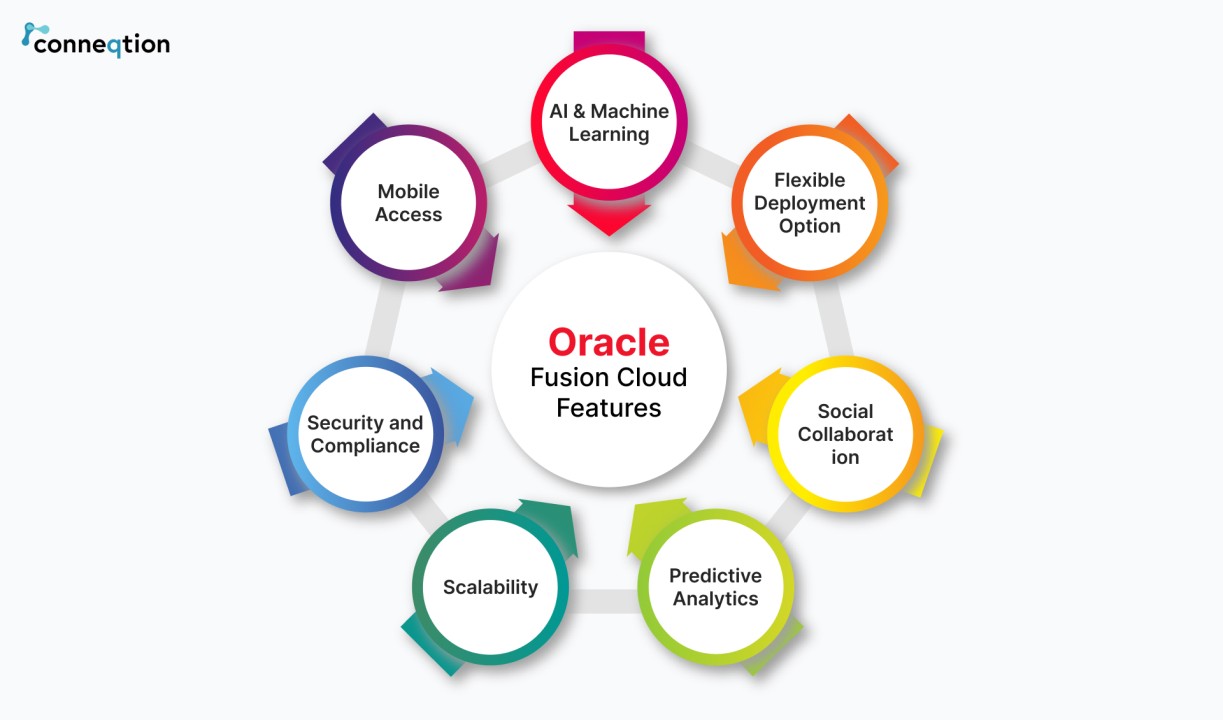
Other platforms and services
To complete the ecosystem, Oracle also provides:
- Oracle Cloud Infrastructure (OCI): cloud infrastructure platform, competing directly with AWS, Azure and Google Cloud.
- Oracle Exadata: optimal hardware solution for databases, accelerating processing performance.
- Middleware & APEX: middleware tools and low-code application development platform, supporting businesses to build customized solutions quickly.
Through the combination of powerful databases and comprehensive business applications, Oracle affirms its position as one of the world's leading technology solution providers.
Optimizing Finance – Accounting: From Oracle ERP software to specialized solutions such as Bizzi.vn
In the context of businesses accelerating financial digital transformation, using only a powerful ERP system like Oracle Fusion Cloud ERP is sometimes not enough to meet the need for deep automation of detailed processes. The combination of Oracle ERP and the Bizzi.vn financial automation platform provides a comprehensive solution to help optimize operations - from strategy to execution.
The Role of Oracle ERP Software in Corporate Financial Management
Oracle Fusion Cloud ERP is one of the world's leading ERP solutions, especially powerful in financial management, helping businesses maintain transparency, comply with regulations and make more accurate decisions. Key financial/accounting modules include:
- General Ledger Management (GL):
Automatically post journal entries, consolidate multi-company, multi-currency financial data, and provide real-time financial reporting. - Accounts Receivable (AR):
Manage the entire sales invoice lifecycle, reconcile payments, and reduce the risk of overdue debts. - Accounts Payable (AP):
Control supplier payment process, support multi-level approval, reduce errors through automation. - Cash Management & Cash Flow:
Integrate with banks to track real-time cash flow, create accurate cash flow forecasts. - Fixed Assets Management:
Track the entire asset life cycle from acquisition, depreciation, to disposal, ensuring optimal capital efficiency.
Unique strengths:
Oracle Fusion Cloud ERP provides Advanced Budgeting & Forecasting tools that use what-if analysis to help businesses simulate multiple financial scenarios before making decisions. Combined with detailed asset lifecycle management, the system provides a holistic view of financial health, supporting long-term strategic planning.
Existing Problems & The Complementary Role of Dedicated Financial Automation Solutions
Although Oracle ERP software is a comprehensive system, many businesses still have difficulty with detailed processes such as:
- Processing invoices manually in large volumes is prone to errors.
- Slow cost control, lack of real-time budget overrun warnings.
- Time consuming data reconciliation between ERP system and internal reports.
At that time, businesses needed a solution to fill these gaps by providing a specialized financial automation platform, which is Bizzi.
Bizzi.vn a dedicated financial automation platform, focused on cost management and accounts payable, focus on:
- Invoice & Payable Management: Automatically digitize invoices (e-invoice), compare with PO, detect discrepancies immediately.
- Expense Management: Quickly record and classify expenses, approve on digital platform, reduce closing time.
- Smart Alerts: Alerts you when there are unusual or over-budget costs.
The special thing is that Bizzi does not replace ERP, but accelerates and enriches data for ERP, Full integration with ERP to help the finance department have more timely and accurate information to make decisions.
Integration mechanism between Oracle NetSuite and Bizzi.vn
Integration Oracle NetSuite and Bizzi.vn for the purpose of:
- End-to-end automation.
- Minimize manual data entry between systems.
- Speed up the approval and payment process, especially important for businesses with multiple suppliers.
Benefits of integration:
- Increase efficiency: Automatically push invoice and document data into NetSuite, reducing processing time by 70-80%.
- High Accuracy: Eliminate data entry errors, data is automatically reconciled with POs and spending policies.
- Better transparency & control: Provide real-time dashboards to track approval status and cost situation.
- Optimize the closing process: Shorten the time to close accounting books, improve reporting capabilities for management.
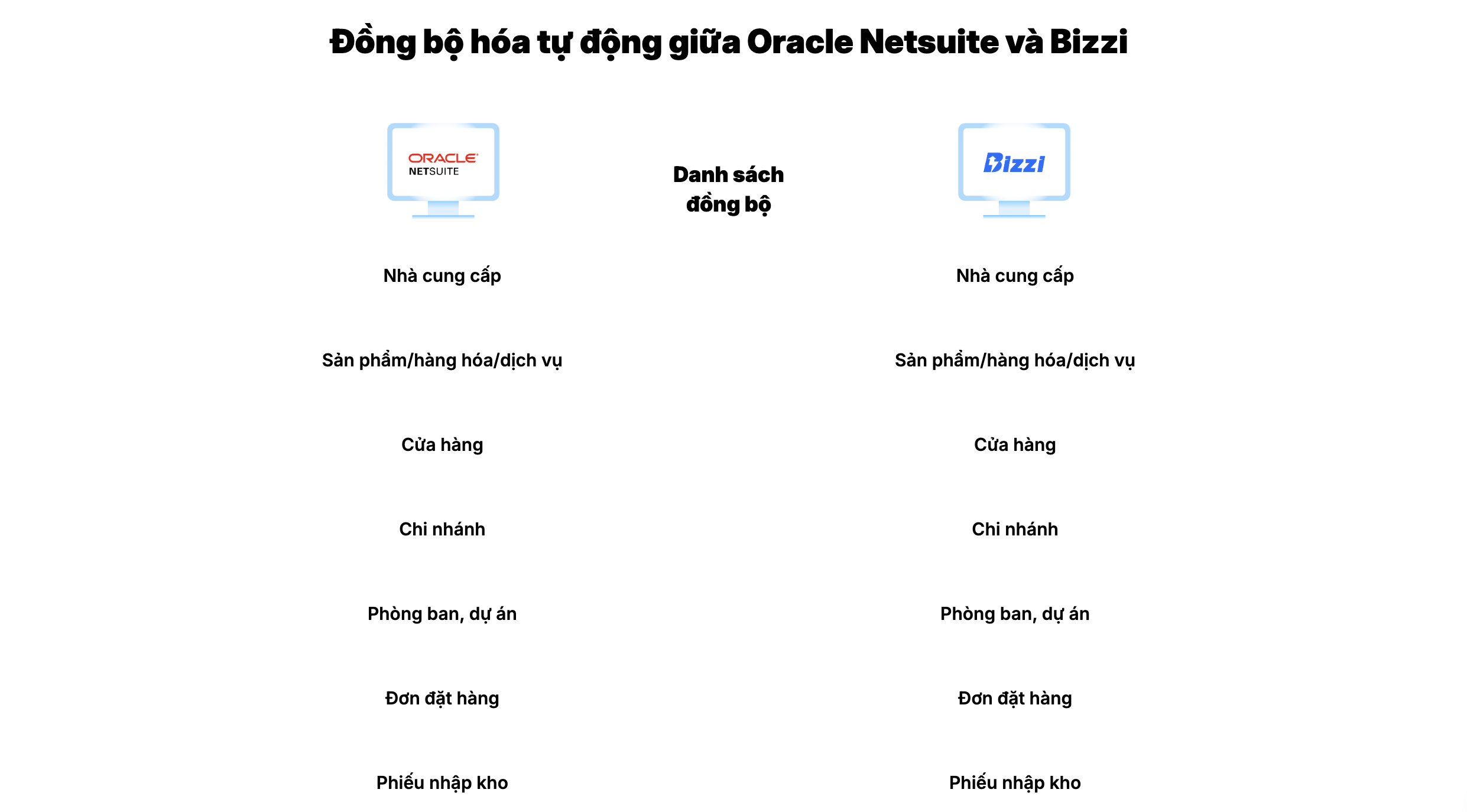
Frequently asked questions about Oracle software
Below is a summary of common questions from users before and during the use of Oracle software:
How much does Oracle software cost?
The cost of using Oracle depends on the product (Oracle Database, Oracle ERP, Oracle Fusion Cloud, etc.), the deployment type (On-premise or Cloud) and the size of the business. Oracle usually charges based on the number of users, data capacity and functional modules. With the Cloud version (SaaS), Oracle offers a monthly/yearly subscription model, which is easier to scale than the On-premise perpetual license.
Is Oracle suitable for small business?
Oracle mainly serves large, multinational corporations and businesses with complex processes. However, with the advent of Oracle NetSuite ERP Cloud, small and medium-sized enterprises (SMEs) can also deploy at a more reasonable cost. If an SME wants to optimize a specialized financial area (e.g., cost management, invoices), it can consider integrating with specialized solutions such as Bizzi.vn.
What are the benefits of using Oracle Database?
Oracle Database stands out for its high data processing performance, scalability, strong security (Transparent Data Encryption, Data Redaction), and high availability thanks to technologies such as Oracle Data Guard. This is the core platform that helps businesses process huge volumes of data with high reliability.
What is the difference between Oracle On-premise and Cloud?
- On-premise: Enterprises can install it on their own internal servers, have full control over the infrastructure, but the initial investment cost is high and it is difficult to expand quickly.
- Cloud: Oracle Fusion Cloud or OCI (Oracle Cloud Infrastructure) allows flexible deployment, on-demand payment, automatic maintenance and upgrades, suitable for modern models, especially in the context of businesses wanting to transform digitally.
What is the difference between Oracle Database and Oracle ERP?
- Oracle Database: Is a database management system (RDBMS) used to store, process and manage data. This is the “heart” of the data infrastructure.
- Oracle ERP (Fusion Cloud ERP or NetSuite ERP): Is a comprehensive business management software solution (finance, accounting, supply chain, human resources...). ERP can operate based on Oracle Database or other data technologies.
In other words, Database is the data platform, and ERP is the business application that runs on that platform.
Conclude
Oracle is not only the world's leading database provider but also a comprehensive technology platform, covering everything from infrastructure (Oracle Cloud Infrastructure software), data management (Oracle Database), to business applications (ERP, HCM, CRM). With a seamless ecosystem, Oracle helps businesses:
- Consolidate data across multiple departments, ensuring information transparency.
- Automate operating processes, reduce manual errors.
- Make faster decisions with real-time reporting and advanced analytics.
To maximize the value of Oracle software, businesses can combine with Bizzi.vn – a specialized financial automation platform. Bizzi helps:
- Speed up invoice and payables processing.
- Optimize cost control, detect deviations promptly.
- Smooth data synchronization with Oracle ERP/NetSuite, reducing closing time and improving reporting quality.
➡ Discover how Bizzi.vn integrates with Oracle NetSuite to optimize financial efficiency and maximize the power of the ERP system. Register for a demo here: https://bizzi.vn/dat-lich-demo/
